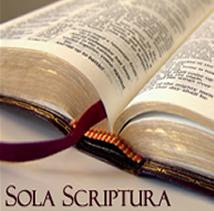 “Let God-inspired Scripture decide between us; and on whichever side be found doctrines in harmony with the word of God, in favor of that side will be cast the vote of truth.” – Basil of Caesarea (c. 330 – 379 A.D.)
“Let God-inspired Scripture decide between us; and on whichever side be found doctrines in harmony with the word of God, in favor of that side will be cast the vote of truth.” – Basil of Caesarea (c. 330 – 379 A.D.)
“We affirm that a confession of the full authority, infallibility, and inerrancy of Scripture is vital to a sound understanding of the whole of the Christian faith. We further affirm that such confession should lead to increasing conformity to the image of Christ. We deny that such a confession is necessary for salvation. However, we further deny that inerrancy can be rejected without grave consequences, both to the individual and the church.” – Chicago Statement of the International Council on Biblical Inerrancy
“In the empire of the church, the ruler is God’s Word.” – Martin Luther – Works, Vol. 41, p. 134.
“I have learned to ascribe the honor of infallibility only to those books that are accepted as canonical. I am profoundly convinced that none of these writers has erred. All other writers, however they may have distinguished themselves in holiness or in doctrine, I read in this way. I evaluate what they say, not on the basis that they themselves believe that a thing is true, but only insofar as they are able to convince me by the authority of the canonical books or by clear reason.” – Martin Luther
“Since the church is Christ’s Kingdom, and he reigns by his Word alone, will it not be clear to any man that those are lying words by which the Kingdom of Christ is imagined to exist apart from his scepter (that is, his most holy Word)?” – John Calvin, Institutes
“Let the pastors boldly dare all things by the word of God. . . Let them constrain all the power, glory, and excellence of the world to give place to and to obey the divine majesty of this word. Let them enjoin everyone by it, from the highest to the lowest. Let them edify the body of Christ. Let them devastate Satan’s reign. Let them pasture the sheep, kill the wolves, instruct and exhort the rebellious. Let them bind and loose thunder and lightning, if necessary, but let them do all according to the word of God.” – John Calvin, Sermons on the Epistle to the Ephesians, p. xii
“…have you not read what was spoken to you by God…” – Jesus Christ (Matt. 22:31)
There has been an unprecedented crisis in the Church in the last two hundred years as to the question “Can we trust the Scriptures?” There has been a wholesale loss of the sense of authority.
To understand the issues involved in our day, I am convinced that we need to know something about the 16th Century Protestant Reformation. The central issue was Justification by faith alone (Latin: sola fide). Yet often overlooked is another controversy which was equally as serious for the life of the Church.
The material issue of the Reformation was the debate over justification by faith alone. The formal issue (the structure in which the whole debate ensued) was the issue of final authority – who or what speaks for God?
Continue reading →
 Continued from Part 1 “is God’s authority invested in a book or in an Institution (the Church)?”
Continued from Part 1 “is God’s authority invested in a book or in an Institution (the Church)?”
 “Let God-inspired Scripture decide between us; and on whichever side be found doctrines in harmony with the word of God, in favor of that side will be cast the vote of truth.” – Basil of Caesarea (c. 330 – 379 A.D.)
“Let God-inspired Scripture decide between us; and on whichever side be found doctrines in harmony with the word of God, in favor of that side will be cast the vote of truth.” – Basil of Caesarea (c. 330 – 379 A.D.)